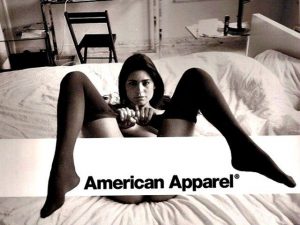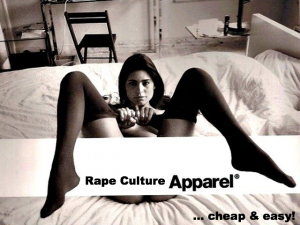Original Ad

I found this ad heading an article from 2015 titled ‘American Apparel Rebrands: Now Casting ‘Real Models’ Not ‘Instagram Hoes’. American Apparel is well known for its controversial and provocative ads, as well as for casting pornographic actors in several of its campaigns (Serio, 2015). While this brand is a blatant example of sexual exploitation in fashion media, the problem I hope to address with my “jamming” is that many companies still advertise under the philosophy of “Sex Sells.” The brand attributes its success to the use of provocative young girls in ad campaigns, which brought them enormous publicity. The company’s founder, Dov Charney, was responsible for the marketing decisions behind the ads and received multiple accusations of unwanted sexual conduct before he was fired in June, 2014 (Prideaux, 2014). American Apparel boasted “our models are real girls who are often employees or friends of the company” (The Week, 2010). This was challenged by critics, however, because only conventionally beautiful and slender models were used in photo shoots, not factory workers. Many were professional models and, in some instances, even underage. The company continued with its risqué advertising after the loss of Charney, despite constant backlash that their ads are sexually exploitative and offensive to women. The ad I chose is a prime example of this. The woman in the photo is wearing nothing but stockings and positioned in a vulnerable way that invites sex. The ad is meant to shock and entice the onlooker to want more. American Apparel thinks it’s challenging the status quo. Once their advertising strategist stated that they photograph models in a way that’s honest because they aren’t so constrained by the rules (The Week, 2010). The company however has proven itself to be anything but honest and continuing on with these ads is a step in the wrong direction for empowerment of women and the abolishment of rape culture. We should always think twice before buying into advertisement like this because it supports companies with skewed morals.
Jammed Ad

I altered the ad with the hopes of exposing the injurious social message American Apparel is projecting. The company uses sex and promiscuity to sell its products. The woman featured here is almost completely nude, positioned in such a way that renders her vulnerable and inviting of sex. Unwanted or not, this normalizes the idea that women’s bodies are to be looked at, fantasized about, and used for sexual purposes. This ad perpetuates rape culture by instilling that women who are raped are asking for it by dressing or looking ‘appealing.’ The woman in this ad does not appear to be in ownership of her body. While she doesn’t look upset or distressed, the expression on her face fails to give the impression that she is fully consenting to the situation. This amplifies the objectification of women by taking away her ownership and control over her body. The bottom line is that, in this ad, American Apparel is using her body to sell their clothes. They boast their products as trendy and affordable. By making this woman look easy to take advantage of, they are hoping consumers will take advantage of their clothes, offered at reasonable prices. For this reason, I added “… cheap & easy” to the bottom line. It is frightening how easy it is for companies like this to promote rape culture and dehumanize women and their bodies. If we buy into it then we promote it further. I hope that my jammed version of the ad makes it plain to see just how simple and easy it is to project these kinds of social messages, as well as how easily they can become normalized. When deconstructed, this ad seems almost ridiculous, but we forget that this is just one of many sexist and offensive ads out there. It is important for us to be critical when buying products. We must recognize the social influences companies like American Apparel are utilizing and decide whether we want to support them or not.
References
- American Apparel: A timeline of controversy. (2010, June 25). Retrieved from http://theweek.com/articles/493221/american-apparel-timeline-controversy
- American Apparel: The Rise, Fall and Rebirth of an All-American Business. (2017, August 19). Retrieved June 25, 2018, from http://www.thefashionlaw.com/home/the-rise-and-fall-of-american-apparel
- Prideaux, D. (2014, September 12). American Apparel’s banned ads are a shocking example of marketing. Retrieved from https://www.theguardian.com/media-network/media-network-blog/2014/sep/12/american-apparel-banned-advert-shock
- Serio, K. (2015, March 25). American Apparel Rebrands: Now Casting ‘Real Models’. Retrieved from http://www.breitbart.com/big-hollywood/2015/03/25/american-apparel-rebrands-now-casting-real-models-not-instagram-hoes/
Hi, this is a comment.
To get started with moderating, editing, and deleting comments, please visit the Comments screen in the dashboard.
Commenter avatars come from Gravatar.